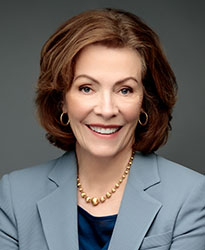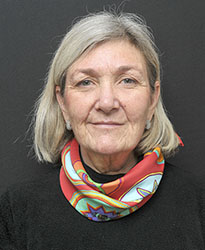Radiation Oncology Department Announces First-Ever Director of DE&I: Q&A with Sophia Kamran, MD
Sophia Kamran, MD shares more about her experiences at Mass General and her work in the DE&I space.
NewsMar | 28 | 2023
Women in oncology at the Mass General Cancer Center have made many critical contributions and advancements to the field over the years. This Women’s History Month, we spoke with Therese Mulvey, MD, Nancy Tarbell, MD, and Marcia J. Browne, MD about their career journeys and advice they have for young women entering science and medicine. Here’s what they said.

Therese Mulvey, MD: At the beginning of my career, I really had to decide between a science-based career and a clinical-based career. Translational medicine was not a thing. I had initially started thinking I wanted to be a physician-scientist with a wet lab and went through that track until my third year of fellowship when I had my second child and really recognized that you could have it all, but you just couldn't have it all at once.
I definitely made some trade-offs at pivotal junctures in my career where I chose family over career advancement, but I'm at the end of my career and I don’t think I would have done anything differently because ultimately, I got to where I wanted to be.

Nancy Tarbell, MD: I was the only woman resident in 1980 (in the Joint Center for Radiation Therapy [JCRT] residency program) and only the second female faculty member ever hired in our department in 1983 (the first woman had previously departed after one year). I felt welcomed, yet I didn’t have role models in my specialty, and I found the culture different from that which exists today. I certainly hope the comments expressed during that era are a thing of the past. Also, during that time there was a presumption that going part-time meant that you weren’t serious about your profession. While I never worked part-time, that message was abundantly clear.
As the first woman professor in Harvard Medical School’s Radiation Oncology Department, I was excited for the opportunity to serve as a role model and to mentor younger women. It would be another 15 years before the second and third women joined the rank of full professor. Thankfully, that has changed, and women are today being recognized and rewarded for their expertise, talent, and contributions.

Marcia J. Browne, MD: Things were very different. To give you an example, when I was a medical student at Georgetown, we weren't allowed to take a rotation in ear, nose, and throat surgery because the chief of that department didn't think women should see blood. Additionally, we weren't allowed to take a rotation in urology because several congressmen and senators came to this particular urology office, and the urologists didn't think that they would want a rectal exam from a woman.
I graduated from medical school in 1979 and had my children during my early years of training. I used to have to get this big silver cart out of one of the labs and put my breast pump on it. Sometimes I'd be in clinic all day, which was in a different building, and I couldn't run back all the way back to the hospital. So, I'd have to lug the cart over to the clinic. It's just so different these days, but I never felt any resentment for it. I felt privileged that I could be a mother and a doctor. But now you realize, all that time could have been spent doing clinical research instead of lugging a pump around. And I did notice that every time somebody saw me, they would say, “Oh, how are your babies?” when instead they used to say, “How's your research? How's the breast cancer protocol going?”
Another thing that’s changed over the years is women's attitudes. These young women, they just go for it. They're smart, they're efficient, they're capable. And I look at them with absolute amazement that they have these young families but they're also writing articles for Nature and The New England Journal of Medicine and doing all these things. I find that being involved with Women in Oncology, even though I'm sort of the grandmother of the group, is extraordinarily rewarding for me because I see these young women and I'm so thrilled at how they're doing.
Therese Mulvey, MD: Women face a lot of hurdles in science. I recently listened to Building a New Leadership Ladder: Transforming Male-Dominated Organizations to Support Women on the Rise by Carol J. Geffner on tape, and it’s really about how implicit bias does exist and that there’s still this pervasive sense that women can’t do science. It's assumed that men will be successful, but it's not assumed that women will be.
Nancy Tarbell, MD: Culture changes slowly. I view childcare for both men and women as the greatest hurdle that remains to be cleared. Attitudes related to work-life balance and family time, as well as salary equity, also present some of the greatest challenges women face today. We have made great progress over the past decades, but much remains to be done.
Marcia J. Browne, MD: The major problem for women still is the balance. I had to give up something to have a career and a family. I trained as a clinical researcher at the National Cancer Institute, and that's what I intended to do–to stay in academics and be a clinical researcher. I loved it. And then I had two children. I would be sitting on the floor playing blocks with them at night, and I'd be looking over at my briefcase because there was a protocol in it to finish, or there were papers to write, and I thought, “I can't do it.” So, I dropped out of clinical research and once we moved from Brown University to Boston, Bruce Chabner, MD offered me a job as the head of the breast section at Mass General. But I wasn’t able to work one day a week at home, so I gave that up and I went into a clinical practice where I would see patients all day and had no extra jobs to do when I came home.
And then, when my youngest son was a second semester senior in high school and clearly didn't need me anymore, I went back to Mass General as a clinical workhorse, and I’ve enjoyed this part of my career more than any other.
I think the other thing that women still face is that sometimes they aren't taken as seriously as men. If you have a woman standing next to a man and only one of them is the professor about to give the lecture, 90% of people will still look towards the man thinking he's the one that's going to get up and go give the lecture even when it's the woman.
Therese Mulvey, MD: Entering oncology has to be a purposeful choice. Medicine is never easy, and oncology is particularly not easy. If you're planning to have a family, I think you have to understand that there are purposeful choices you need to make, and you have to reconcile yourself to the implications of those choices.
The other thing I'd say is don't set your life goals more than five years ahead because things change. You can have the five-year plan and then be working on the next five-year plan, but you can't have the 40-year plan.
Nancy Tarbell, MD: First, remain positive and mission-driven! Doing so will buttress you on those difficult days when you feel you're being treated differently because of your gender. Second, learn the art of negotiation. Third, remember that your peers are often your best mentors. Finally, network and draw on the support of others while allowing them to learn from you. Doing so will create a community of colleagues, mentors and friends that will serve you throughout your career.
Marcia J. Browne, MD: I have two pieces of advice with regards to finding balance, and they’re both from T. Berry Brazelton, renowned international expert on child development, researcher, author. Number one, when the kids are young, live like you're rich. Get help so you can spend unstressed time with the kids. If you can, hire good daycare, someone to clean your house, someone to babysit so you can keep your relationship up with your partner, etc. The second thing is, you're going to have to steal time at different parts of your week, your year, your life from either your work or your children. And you should steal from your work because you have 18 years with your children and then they are gone.
Another piece of advice for women is to keep your doors open. Maybe you're not going to do enough work that you're going to get professor in 20 years. You might get professor in 30 years, but if you hang in there, do what you have to do to keep the door open and plot along, then there comes a time when you have more time, and you can just dive right into it.
Therese Mulvey, MD: I think the thing about the Cancer Center is that there has been a core group of Women in Oncology that are incredibly supportive of one another, who generate community and a safe space for people to talk about issues. It is an amazing group of women who are your work family. With COVID, one of the things that changed for me professionally was the inability to have those collegial relationships in clinic and ad hoc conversations down the hall, but this Women in Oncology group bridged that gap.
These women inspire me–not only to be a better physician–but in so many other ways as well. We talk about books that we’re reading, yoga, cooking, better health habits, better interpersonal relationships, leadership development, etc. The way that this group has stretched me physically, emotionally, and intellectually has been incredible, and I’m grateful for the deep and meaningful friendships that have really transcended generations.
Marcia J. Browne, MD: I think the Mass General Cancer Center has been extraordinarily flexible and supportive. They’re aware that not just young women, but men, have other lives, and that it takes time to raise a family. And I think that there's a lot of understanding about that in terms of scheduling and supporting salaries. There's no reason that someone should give it up these days, like I did, without recourse.
Therese Mulvey, MDThe way that this [Women in Oncology] group has stretched me physically, emotionally, and intellectually has been incredible, and I’m grateful for the deep and meaningful friendships that have really transcended generations.
Advances in Motion provides health care professionals with information about the latest breakthroughs, research & clinical advances.
Sophia Kamran, MD shares more about her experiences at Mass General and her work in the DE&I space.
Bonus Episode of the Charged Podcast
An integral part of one of the world’s most distinguished academic medical centers, Mass General Cancer Center is among the leading cancer care providers in the United States.